 Petzlover
Petzlover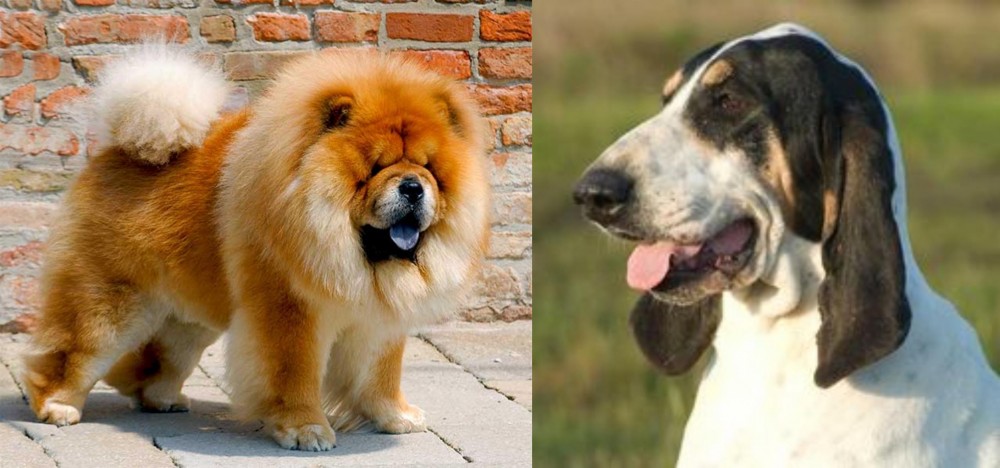 Chow Chow is originated from China but Grand Gascon Saintongeois is originated from France. Chow Chow may grow 22 cm / 8 inches shorter than Grand Gascon Saintongeois. Both Chow Chow and Grand Gascon Saintongeois are having almost same weight. Both Chow Chow and Grand Gascon Saintongeois has almost same life span. Both Chow Chow and Grand Gascon Saintongeois has almost same litter size. Chow Chow requires High Maintenance. But Grand Gascon Saintongeois requires Low Maintenance
Chow Chow is originated from China but Grand Gascon Saintongeois is originated from France. Chow Chow may grow 22 cm / 8 inches shorter than Grand Gascon Saintongeois. Both Chow Chow and Grand Gascon Saintongeois are having almost same weight. Both Chow Chow and Grand Gascon Saintongeois has almost same life span. Both Chow Chow and Grand Gascon Saintongeois has almost same litter size. Chow Chow requires High Maintenance. But Grand Gascon Saintongeois requires Low Maintenance
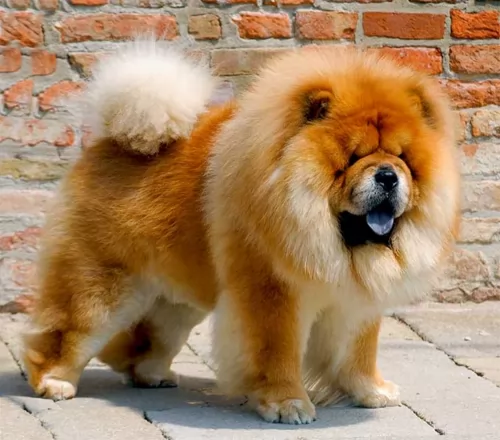 Northern China is the original home of the Chow Chow. In that region of China, the breed was known as the Songshi Quan – “the puffy-lion” dog. They have also been known in China as the “Dog of the Tang Empire” or the Tang Quan. The Chow is believed to be an ancient breed that the Foo Dog, or stone dog guardians of Buddhist palaces and temples, is modeled after. It is one of the most ancient of dog breeds that are still around today.
Northern China is the original home of the Chow Chow. In that region of China, the breed was known as the Songshi Quan – “the puffy-lion” dog. They have also been known in China as the “Dog of the Tang Empire” or the Tang Quan. The Chow is believed to be an ancient breed that the Foo Dog, or stone dog guardians of Buddhist palaces and temples, is modeled after. It is one of the most ancient of dog breeds that are still around today.
It is believed that they have existed for around 2000 years or perhaps even as far back as 3000 years, starting out in Mongolia and migrating to China. The ancientness of the Chow Chow has been validated through DNA testing. In China all those centuries ago, the Chow Chow was born to be a working dog. They hunted, herded, guarded and pulled carts. They went on quests with the Mongolian armies when China was invaded, as well as when the Mongolians invaded the Middle East and Europe later on.
Today’s Canadian Kennel Club has about 350 Chows registered while the AKC gets 10,000 new registrations every year.
 Known also as the Virelade, the Grand Gascon Saintongeois hails from the Saintongeois region of France, being a newish addition to the hunting dog breed.
Known also as the Virelade, the Grand Gascon Saintongeois hails from the Saintongeois region of France, being a newish addition to the hunting dog breed.
The Saintongeois hound and the Grand Blue de Gascogne are the ancestors of this scentdog as these two breeds themselves, are exceptional hunters. The Grand Gascon Saintongeois is a large dog and favored by the French nobility for its ability to hunt.
After the French Revolution the popularity of the breed waned. It was Baron Joseph de Carayon-LaTour who tried to revive the Saintongeois Hound. The dogs were mated with the Grand Bleu de Gascogne and were so outstanding that breeding was continued. The breed that was created is the Grand Gascon Saintongeois which we know today.
It was in January 1993 that the Grand Gascon Saintongeois was officially recognized by the United Kennel Club.
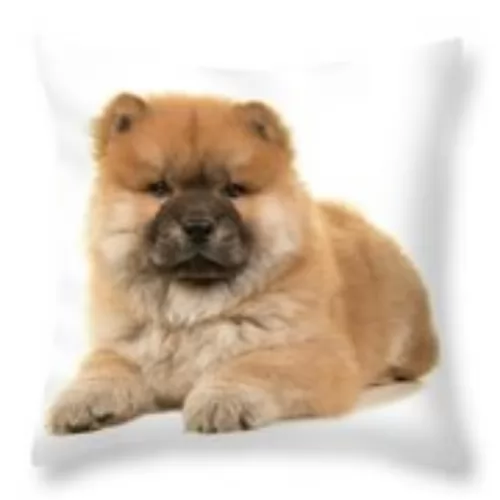 The Chow really does look like a small lion with a black tongue. The dog is sturdy and square with erect, small ears on a broad skull. They have a very dense double coat. Their eyes are deep set and look like almonds, while they all have that very distinctive purple or black tongue. Their lips are also distinctive with their blue color. The nose is black, but some Chows might have a blue nose. The tail is curly.
The Chow really does look like a small lion with a black tongue. The dog is sturdy and square with erect, small ears on a broad skull. They have a very dense double coat. Their eyes are deep set and look like almonds, while they all have that very distinctive purple or black tongue. Their lips are also distinctive with their blue color. The nose is black, but some Chows might have a blue nose. The tail is curly.
These are medium size dogs when it comes to height and weight, but they are powerfully built for their size. Their power is in their compact body holding the energy and strength of a much larger dog. Its hind legs are almost entirely straight, unusual for any dog. They get their lion appearance from the huge ruff that stands behind their heads. Their chest is broad and deep.
 The Grand Gascon Saintongeois is a large, well built breed of dog that looks strong and robust. His head is strong and covered with loose skin that forms wrinkles around the cheeks. He stands at 61-73cm and weighs 30 to 35kg.
The Grand Gascon Saintongeois is a large, well built breed of dog that looks strong and robust. His head is strong and covered with loose skin that forms wrinkles around the cheeks. He stands at 61-73cm and weighs 30 to 35kg.
He has straight, long legs. He has a short, smooth coat which is white with black patches. Sometimes you'll also find a speckled or ticked pattern. There'll be tan dots over the eyes.
The eyes are brown, the nose black and the long, thin textured ears are low on the dogs head and also well back on the skull. The tail is long.
He is known for his deep voice to voice an opinion. He is a loving, friendly, courageous and affectionate breed with a well balanced temperament, making him a splendid pet. He is also intelligent and so he won't battle at all to learn some rules. Training and socialization will be good for him even though he is such an amicable dog already, but then he just becomes extra obedient.
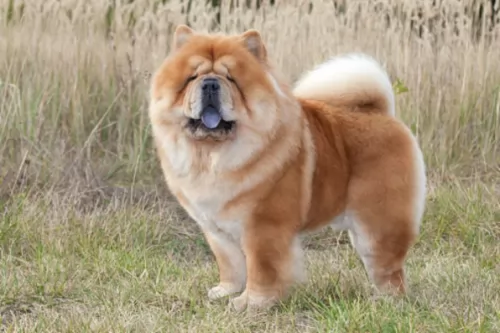 Loyal and true to their family and those they know; the Chow Chow is a little standoffish with strangers. They are very protective and usually attach themselves to one or two people. They are intelligent but stubborn, which can affect your training with them. They need to respect their people and Chows respect hose who take care of them. They can be aggressive toward dogs of their same sex especially if those dogs are the same breed as well.
Loyal and true to their family and those they know; the Chow Chow is a little standoffish with strangers. They are very protective and usually attach themselves to one or two people. They are intelligent but stubborn, which can affect your training with them. They need to respect their people and Chows respect hose who take care of them. They can be aggressive toward dogs of their same sex especially if those dogs are the same breed as well.
They are known to be very clean and many have compared them to cats in that regard. They appear to be dignified and refined. They are usually very quiet but very adaptable dogs.
 Your Grand Gascon Saintongeois is a true hunting dog breed and valued for his hunting prowess. He has another side to him though and is gentle, loving and calm with his human family.
Your Grand Gascon Saintongeois is a true hunting dog breed and valued for his hunting prowess. He has another side to him though and is gentle, loving and calm with his human family.
He makes a wonderful family companion, getting on well with children as well as pets in the home. He may show a bit of aggression to strangers and this is why training and socialization works so well with him as it helps him behave well around family and strangers.
Training is never a problem as he is an intelligent dog. He is an energetic dog and won't fit well into city life in tiny properties, also because of his tendency to bark when bored. He fits well into country life or large properties.
When you provide your large pet with good food, a warm place to sleep, exercise and plenty of love and attention, the Grand Gascon Saintongeois is going to turn out to be one of the most loyal, affectionate pets you can imagine.
 Although an ancient breed that obviously has survived many centuries of trials, the Cho Chow of today is prone to several different health conditions. These include:
Although an ancient breed that obviously has survived many centuries of trials, the Cho Chow of today is prone to several different health conditions. These include:
This condition can require surgery to keep the turning eyelid from injuring the eye ball.
This can cause lameness and arthritis.
This can cause lameness and arthritis.
Make sure you keep the ears clean and keep an eye on them.
 Your Grand Gascon Saintongeois is a robust dog, who with good care can reach up to 14 years of age. You're not going to be running to the vet often with this strong looking dog, but even so, there are one to two problems that you'll want to look out for.
Your Grand Gascon Saintongeois is a robust dog, who with good care can reach up to 14 years of age. You're not going to be running to the vet often with this strong looking dog, but even so, there are one to two problems that you'll want to look out for.
Long-eared dogs are more susceptible to canine ear infections. The symptoms of the infection will be dependent on how severe it is. Certainly your dog may experience pain and you'll see him shaking his head and pawing at his ear. If both ears are affected by inflammation, he may even walk in a wobbly fashion and the infection could lead to deafness. It is imperative that he get to the vet as soon as possible.
This is where the ball and socket joint of the hip is malformed. It results in a joint rubbing and grinding. It can lead to loss of function of the hip joints. It is a common skeletal disease in young or old dogs, small or large dogs and in both males and females.
Large dogs are more commonly affected though with hip dysplasia which can see arthritis developing too. Your dog will display decreased activity and difficulty with standing up after lying down. Veterinary intervention will be required.
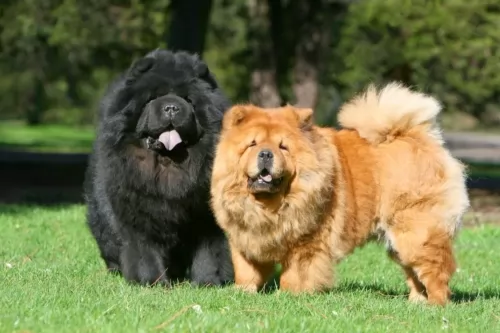 Don’t overfeed a Chow Chow as they are hard workers and big eaters. Feed them at least twice a day.
Don’t overfeed a Chow Chow as they are hard workers and big eaters. Feed them at least twice a day.
This eye disease can lead to blindness if not checked and treated.
These can be removed from an adolescent puppy.
Again, the Chow is susceptible to cancer.
Can lead to heart or kidney problems if left untreated.
Keep a close eye on your Chow Chow skin.
The Chow Chow was developed as working dog, but today’s version is more laid back and doesn’t need excessive exercise. Daily walks will suffice. They live very happily in the city if walked regularly. They are not really a competitive breed outside of obedience and confirmation. They are seldom seen in sports like agility or frisbee.
 These large dogs with their short smooth coats have very little grooming needs. Regular brushing twice a week will remove dead hair and also ensure the good condition of the coat.
These large dogs with their short smooth coats have very little grooming needs. Regular brushing twice a week will remove dead hair and also ensure the good condition of the coat.
He has long ears and these will need to be checked regularly to avoid ear infections. It will be a good idea to learn how to clean the ears and to do it in such a way as to avoid damaging them. Signs of ear infection include redness, discharge, irritation and bad odor.
Following the feeding instructions on the packaging of top quality kibble, provide your Grand Gascon Saintongeois with at least 2 meals a day. To steer away from the monotony of kibble every day, mix in some raw meat from time to time, and also include some cooked brown rice, chicken and vegetables as a tasty treat. Fresh, cool water should always be easily accessible to him.